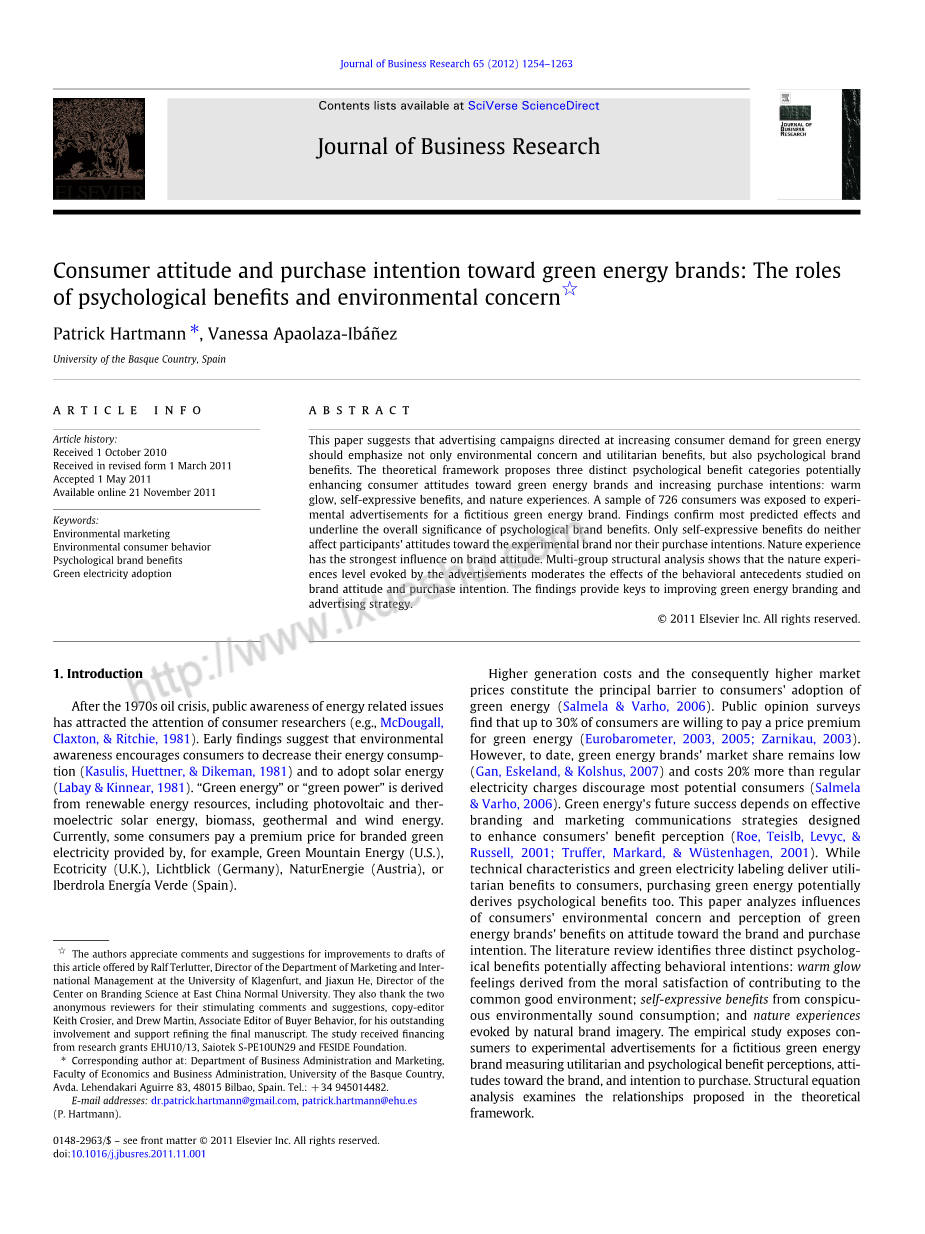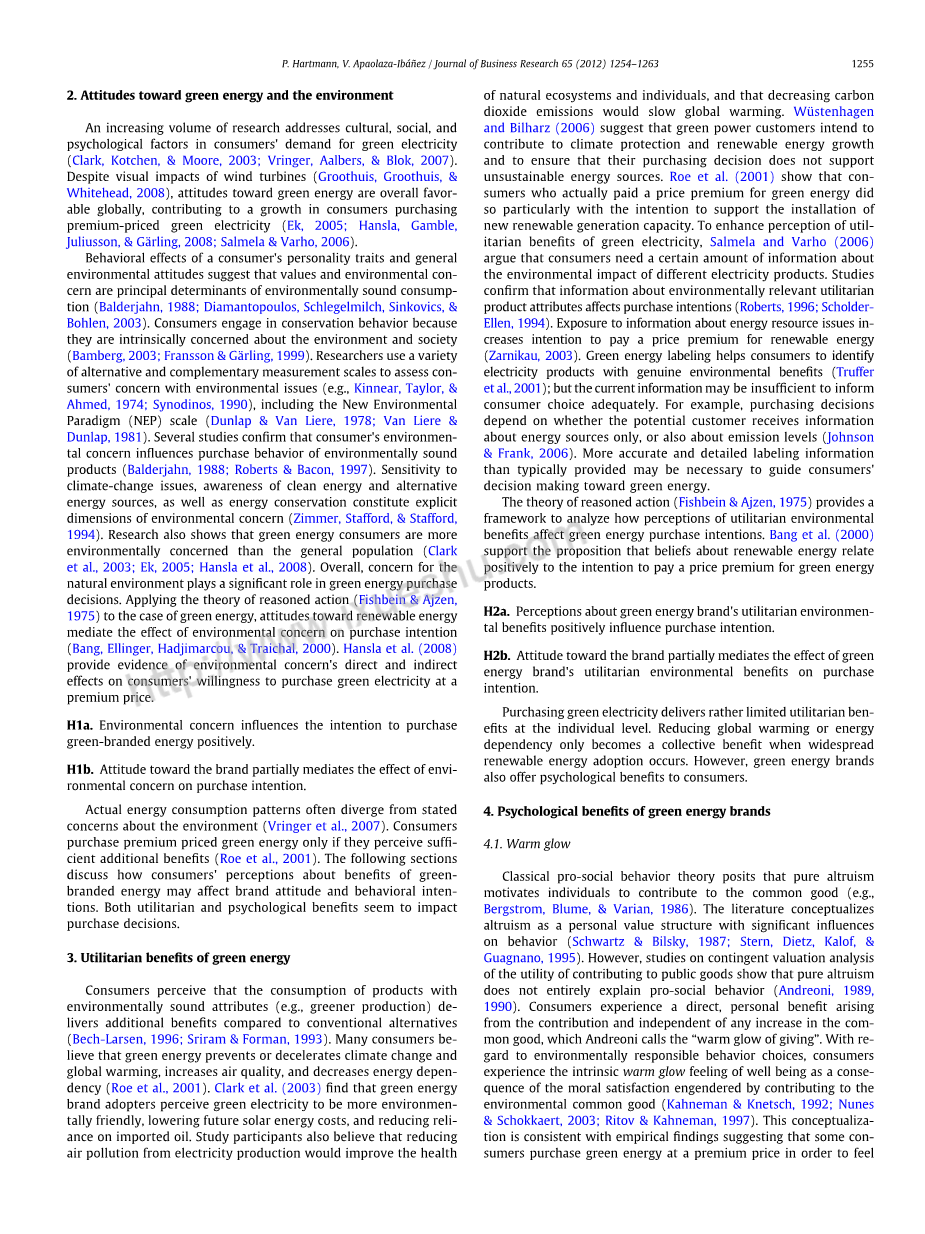

英语原文共 11 页
Author(s):Patrick Hartmann , Vanessa Apaolaza-Ibaacute;ntilde;ez
Consumer attitude and purchase intention toward green energy brands: The roles of psychological benefits and environmental concern
Journal of Business Research 65 (2012) 1254 –1263
消费者对绿色能源品牌的态度和购买意愿:
心理利益和环境关注的作用
译者:营销1501陈靖 0121503920919
This paper suggests that advertising campaigns directed at increasing consumer demand for green energy should emphasize not only environmental concern and utilitarian benefits, but also psychological brand benefits. The theoretical framework proposes three distinct psychological benefit categories potentially enhancing consumer attitudes toward green energy brands and increasing purchase intentions: warm glow[1](温情效应), self-expressive benefits, and nature experiences. A sample of 726 consumers was exposed to experimental advertisements for a fictitious green energy brand. Findings confirm most predicted effects and underline the overall significance of psychological brand benefits. Only self-expressive benefits do neither Environmental consumer behavior affect participants#39; attitudes toward the experimental brand nor their purchase intentions. Nature experience has the strongest influence on brand attitude. Multi-group structural analysis shows that the nature experiences level evoked by the advertisements moderates the effects of the behavioral antecedents studied on brand attitude and purchase intention. The findings provide keys to improving green energy branding and advertising strategy.
Keywords: environmental marketing, environmental consumer behavior, psychological brand benefits, green electricity adoption
本文认为,旨在增加消费者对绿色能源需求的广告活动不仅要强调环境关注和utilitarian benefits,还要强调心理品牌效益。理论框架提出了三种不同的心理利益类别,可能会增强消费者对绿色能源品牌的态度,增加购买意愿:warm glow,自我表达的好处和nature experiences。一个由726名消费者组成的样本接触了虚拟绿色能源品牌的实验性广告。调查结果证实了大多数预测效应,并强调了心理品牌效益的整体意义。只有自我表达的利益既不会影响参与者对实验品牌的态度,也不会影响他们的购买意愿。自然体验对品牌态度的影响最大。多组结构分析表明,广告引发的自然体验水平缓和了所研究的行为前因对品牌态度和购买意愿的影响。这些发现为改善绿色能源品牌和广告策略提供了关键指导。
关键词:环境营销,环境消费者行为,心理品牌效益,绿色电力采用
1. Introduction
After the 1970s oil crisis, public awareness of energy related issues has attracted the attention of consumer researchers (e.g., McDougall, Claxton, amp; Ritchie, 1981). Early findings suggest that environmental awareness encourages consumers to decrease their energy consumption (Kasulis, Huettner, amp; Dikeman, 1981) and to adopt solar energy (Labay amp; Kinnear, 1981). “Green energy” or “green power” is derived from renewable energy resources, including photovoltaic and thermoelectric solar energy, biomass, geothermal and wind energy. Currently, some consumers pay a premium price for branded green electricity provided by, for example, Green Mountain Energy (U.S.), Ecotricity (U.K.), Lichtblick (Germany), NaturEnergie (Austria), or Iberdrola Energiacute;a Verde (Spain).
1. 简介
在20世纪70年代石油危机之后,公众对能源相关问题的认识引起了消费者研究人员的关注(例如,McDougall,Claxton,&Ritchie,1981)。早期研究结果表明,环保意识鼓励消费者减少能源消耗(Kasulis,Huettner,&Dikeman,1981)并采用太阳能(Labay&Kinnear,1981)。 “绿色能源”或“绿色电力”源自可再生能源,包括光伏和热电太阳能,生物质能,地热能和风能。目前,一些消费者为品牌绿色电力支付高价,例如,Green Mountain Energy(美国),Ecotricity(英国),Lichtblick(德国),NaturEnergie(奥地利)或IberdrolaEnergiacute;aVerde(西班牙)。
Higher generation costs and the consequently higher market prices constitute the principal barrier to consumers#39; adoption of green energy (Salmela amp; Varho, 2006). Public opinion surveys find that up to 30% of consumers are willing to pay a price premium for green energy (Eurobarometer, 2003, 2005; Zarnikau, 2003). However, to date, green energy brands#39; market share remains low (Gan, Eskeland, amp; Kolshus, 2007) and costs 20% more than regular electricity charges discourage most potential consumers (Salmela amp; Varho, 2006). Green energy#39;s future success depends on effective branding and marketing communications strategies designed to enhance consumers#39; benefit perception (Roe, Teislb, Levyc, amp; Russell, 2001; Truffer, Markard, amp; Wuuml;stenhagen, 2001). While technical characteristics and green electricity labeling deliver utilitarian benefits to consumers, purchasing green energy potentially derives psychological benefits too. This paper analyzes influences of consumers#39; environmental concern and perception of green energy brands#39; benefits on attitude toward the brand and purchase intention. The literature review identifies three distinct psychological benefits potentially affecting behavioral intentions: warm glow feelings derived from the moral satisfaction of contributing to the common good environment; self-expressive benefits from conspicuous environmentally sound consumption; and nature experiences evoked by natural brand imagery. The empirical study exposes consumers to experimental advertisements for a fictitious green energy brand measuring utilitarian and psychological benefit perceptions, attitudes toward the brand, and intention to purchase. Structural equation analysis examines the relationships proposed in the theoretical framework.
较高的发电成本和较高的市场价格构成了消费者采用绿色能源的主要障碍(Salmela&Varho,2006)。民意调查发现,高达30%的消费者愿意为绿色能源支付高价(Eurobarometer,2003,2005; Zarnikau,2003)。然而,到目前为止,绿色能源品牌的市场份额仍然很低(Gan,Eskeland,&Kolshus,2007),并且比普通电费高出20%,使大多数潜在消费者望而却步(Salmela&Varho,2006)。绿色能源的未来成功旨在有效提高消费者利益感知的品牌和营销传播策略(Roe,Teislb,Levyc,&Russell,2001; Truffer,Markard,&Wuuml;stenhagen,2001)。虽然技术特征和绿色电力标签为消费者带来了实用的好处,但购买绿色能源也可能带来心理上的好处。本文分析了消费者对环境的关注和对绿色能源品牌利益的看法对品牌态度和购买意愿的影响。文献综述确定了可能影响行为意图的三种不同的心理学益处:源于对共同良好环境作出贡献的道德满足所产生的温情效应;显著的无害环境消费带来的自我表现利益;自然品牌形象引发的自然体验。实证研究向消费者展示虚拟绿色能源品牌的实验性广告以此来衡量功利主义和心理效益感知、品牌态度以及购买意愿。利用结构方程分析检验理论框架中提出的关系。
2. Attitudes toward green energy and the environment
An increasing volume of research addresses cultural, social, and psychological factors in consumers#39; demand for green electricity (Clark, Kotchen, amp; Moore, 2003; Vringer, Aalbers, amp; Blok, 2007). Despite v
资料编号:[3518]


